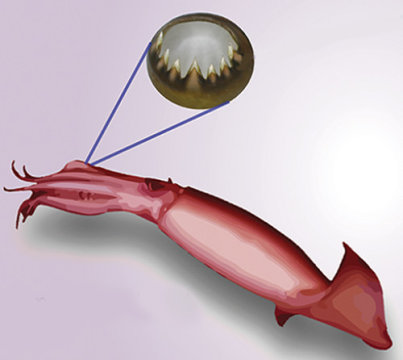Hawaiian bobtail squid. Image: Chris Frazee and Margaret McFall-Ngai
Plastic pollution is devastating the oceans by poisoning animals and contaminating marine environments, but scientists think that the seas may also have a solution to the problem—the tentacles of squid.Squid have evolved complex proteins in the suction-cup cavities that line their tentacles. The proteins are used to build squid ring teeth (SRT), a spiky circle of biopolymer material inside the suckers that allows the animals to grasp prey.Penn State University materials scientists Abdon Pena-Francesch and Melik Demirel think SRT could be engineered as a promising biodegradable replacement for plastics. Fortunately, that would not mean harvesting innocent squid for their sucker teeth. In a study published Thursday in Frontiers in Chemistry, the team describe how bacteria such as E. coli could be genetically engineered to potentially produce industrial quantities of the special proteins that make SRT so flexible, strong, and eco-friendly.
Fortunately, that would not mean harvesting innocent squid for their sucker teeth. In a study published Thursday in Frontiers in Chemistry, the team describe how bacteria such as E. coli could be genetically engineered to potentially produce industrial quantities of the special proteins that make SRT so flexible, strong, and eco-friendly.
Advertisement

The material’s unique molecular properties derive from constituent proteins that repel each other. This separation produces complex molecular structures that range from orderly flat-planed sheets to tangled messes of material.Because of its versatility, synthetic SRT could be integrated into textiles so that clothes leech fewer synthetic fibers into the washing machine, which is a surprisingly large source of ocean plastic pollution. It could also be used to create defensive films or coatings that could be worn to protect from chemical and biological warfare, according to the team."Squid proteins can be used to produce next generation materials for an array of fields including energy and biomedicine, as well as the security and defense sector," Demirel said.Get six of our favorite Motherboard stories every day by signing up for our newsletter.
